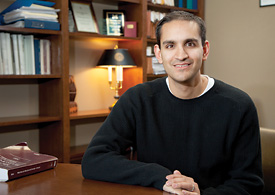
Photo by Scott Soderberg, U-M Photo Services.
Vivek Sankaran says having children of his own has made him realize the extra care that must go into making tough decisions about whether a child in foster care should be reunited with parents.
“I’ve realized how serious it is to take a kid away from a parent and if we’re going to do that, if we’re going to take that extreme step, we better make sure we’re getting it right,” says Sankaran, a clinical assistant professor of law in the Child Advocacy Law Clinic at the Law School, and a 2001 Michigan Law graduate who founded and directs the school’s Detroit Center for Family Advocacy.
Last year, Sankaran helped guide students Beth Kurtz and Helen No in pursuing a legal case that ultimately led to a reunion between a young Flint girl in foster care and her father in Mississippi.
“The courts didn’t know anything about her father, so they didn’t want her to go there,” says Sankaran.
After conducting their own investigation, they found the father to be “just phenomenal,” and they were able to send the little girl to live with her parent.
Even after the successful outcome, Sankaran continued to work with the students to thoroughly study the case they had put together. “Afterwards we spend a lot of time debriefing and thinking if it had been the right approach and what we would have done differently,” he says.
What moment in the classroom stands out as the most memorable?
Every semester, we ask our students to summarize their experiences in six words. Those six words are powerful and convey how much the students have learned.
If you were selling Ann Arbor to a faculty colleague, how would you describe what it has to offer?
The incredible sense of community around the campus and in the surrounding areas.
What is your favorite spot on campus?
The new Law School Commons.
What inspires you?
The parents and the children who I get to work with, and the law students who fight on their behalf every day.
What are you currently reading?
“This is a Soul” by Marilyn Berger.
Who had the greatest influence on your career path?
I’ve had many mentors over the years. But it was the children who I represented in D.C. who taught me about the importance of child welfare law, and the need for well-trained lawyers to work with at-risk families.
“The beauty of it for me was that the students did everything. They were able to do all the arguing before the judge and actually make it happen,” he says. “Not only did the students change this child’s life, they learned important lawyering skills.”
The Detroit Center for Family Advocacy focuses on similar work. The center combines the talents of an attorney, a social worker and a parent advocate to help Detroit-area parents and extended families care for their own children. A goal is to shorten the stays of children who end up in public foster care, and to keep some out of the system.
While obtaining a degree in government at William and Mary College in Virginia. Sankaran’s involvement in programs such as Big Brothers and Big Sisters led him to decide on a career in law. “Throughout college I had a number of experiences working with children in mentoring type roles so I thought that going to law school would give me a chance to combine a lot of those interest and help me improve the lives of kids,” he says.
After graduating from U-M, Sankaran went to Washington, D.C., to work on behalf of children. “It was a learning experience: learning the value of the extended families, learning the resiliency and strength these families have — especially when they didn’t have money,” Sankaran says.
He left four years later to become a clinical law professor at U-M, where he has continued to find opportunities to help children and their families.
The weekly Spotlight features faculty and staff members at the university. To nominate a candidate, please contact the Record staff at [email protected].

